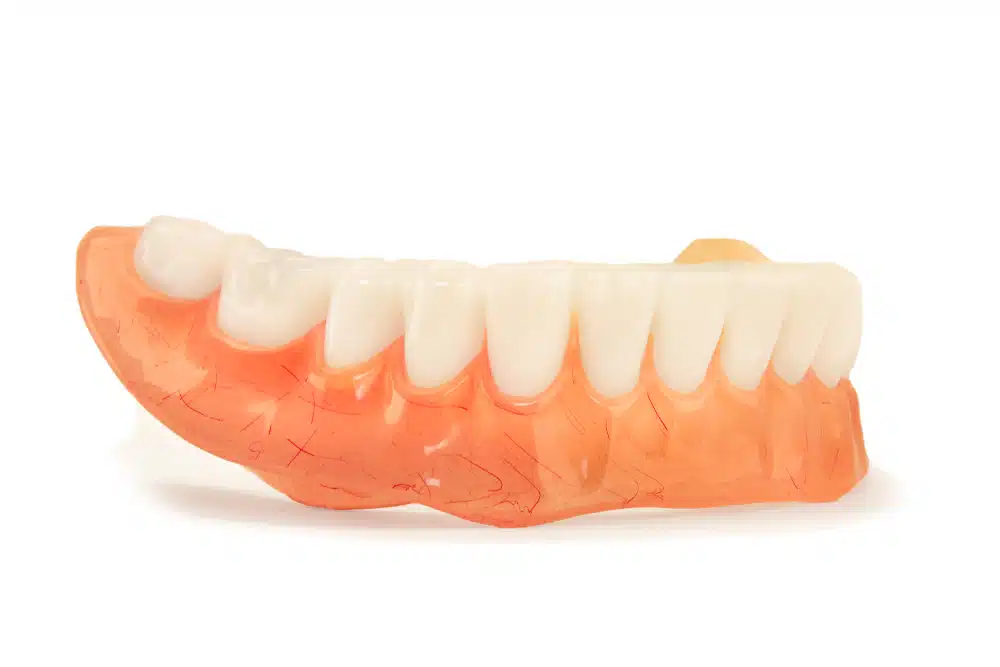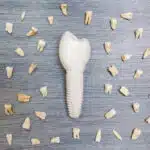
Loose Denture Solution
A New Standard of Care?
Do you suffer from a loose lower denture or have a family member who is having a rough time wearing their denture?
Unfortunately, this is a common problem. When all of the lower teeth are missing, little remains to stabilize or retain the denture.
An upper denture actually creates some suction on the roof of the mouth and will generally hold well. Not so, with the lower denture. First of all, the tongue has a tendency to displace it and because the surface area that the denture rests upon is generally narrow – there is little surface tension to hold it in place.
Many denture wearers have to rely on adhesives to keep their dentures from flopping around while they speak or eat. In a number of cases, even these adhesives fall short of their objective. Not to mention the fact that many patients find the adhesives unpalatable and some concerns have been recently raised about zinc sensitivities and copper de
ficiencies associated with these products.
Eating with full lower dentures can become difficult or even painful. Patients often opt not to wear their lower dentures at all out of frustration or embarrassment. Unfortunately, this can make it difficult to eat certain foods that are needed for good nutrition and health.
Numerous remedies have been forwarded to solve the problem in addition to adhesives. For example, relines can create an improved fit but they still don’t overcome the inherent problems described above. Then, there are dentures that are designed to look like they have octopus suction cups on the bottom, dentures with valves to suck out the air that gets under them, and dentures that have little “wings” on them that hold the denture down by the weight of the tongue.
Probably the greatest advance in denture stability, however, has been the development of dental implants. If a person has enough bone that is of good quality (not too soft) to accept implants, little comes close to these to provide both retention and stability for a loose lower denture. Also, much of the pain associated with dentures moving around and creating sore gums is eliminated because the denture is actually supported by the implants.
But what if you have been told you are not a candidate for conventional implants because of insufficient bone? Countless patients have still been able to benefit from mini-implants.
These are extremely small (1.8 mm diameter) implants that can be used for critically needed support purposes. Mini-implants can and do serve as long-term devices. In fact, some have been successfully functioning in patients for decades.
Because they are so narrow, they can typically be inserted directly through the overlying gum tissue into the bone underneath. This means that the procedure is generally much more comfortable for the patient because (in most cases) there is no need to surgically cut open the gum tissue – routinely required for standard implant cases. As a result, post-operative patient irritation and soreness is significantly reduced.
It should be mentioned that no implant system is fool-proof or has any guarantee of longevity. Such factors as poor oral hygiene, poor health, stress-inducing habits such as tooth grinding and clenching, smoking, poor health, osteoporosis, medications, and lack of follow-up care can all lead to potential failure of the implants. Compared to conventional implants, however, the cost of replacement is generally much smaller and with less bone loss and gum deterioration. Failures involving mini-implants are not unheard of, but are generally quite rare.
As you might expect fees vary from doctor to doctor and by geographic location. Generally, though, the fees tend to be a lot lower than for conventional implants – with similar results, less discomfort and much shorter waiting times. The best way to address the cost issue is to have an open and honest discussion about what fees may arise with the dentist of your choice.
Many dentists now consider an implant-stabilized lower denture the new “standard of care.” By choosing this option you are deciding upon an improved way of life that is free of so many of the heartaches and discomforts associated with loose, painful and ill-fitting dentures. Because people need to use their teeth each and every day of their lives, that’s worth a great deal.





